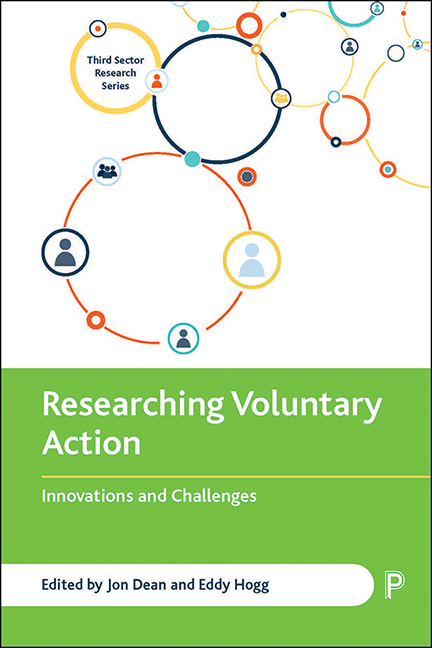Book contents
- Frontmatter
- Contents
- List of figures, tables and boxes
- Notes on contributors
- Acknowledgements
- Series editor’s foreword
- 1 Introduction
- 2 (Un)suitable methods and reflexive considerations: an interview and focus group study of youth volunteering
- 3 Interpretive ethnography: a UK charity shop case study
- 4 Collaborative philanthropy and doing practically relevant, critical research
- 5 Peer research: co-producing research within the context of voluntary and community action
- 6 Charity advertising: visual methods, images and elicitation
- 7 Using archives and objects in voluntary action research
- 8 Using Mass Observation as a source of qualitative secondary data for interdisciplinary longitudinal research on voluntary action
- 9 Investigating meanings and messages on volunteering through television media
- 10 Annual reporting in voluntary organisations: opportunities for content analysis research
- 11 Researching risk in the voluntary sector: the challenges and opportunities of regulatory data
- 12 Exploring the benefits of volunteering: combining survey and administrative data in the Nordic ‘laboratory’
- 13 Spatial approaches to the voluntary sector
- 14 Restudies, surveys and what counts as volunteering
- 15 Conclusion
- References
- Index
12 - Exploring the benefits of volunteering: combining survey and administrative data in the Nordic ‘laboratory’
Published online by Cambridge University Press: 15 September 2022
- Frontmatter
- Contents
- List of figures, tables and boxes
- Notes on contributors
- Acknowledgements
- Series editor’s foreword
- 1 Introduction
- 2 (Un)suitable methods and reflexive considerations: an interview and focus group study of youth volunteering
- 3 Interpretive ethnography: a UK charity shop case study
- 4 Collaborative philanthropy and doing practically relevant, critical research
- 5 Peer research: co-producing research within the context of voluntary and community action
- 6 Charity advertising: visual methods, images and elicitation
- 7 Using archives and objects in voluntary action research
- 8 Using Mass Observation as a source of qualitative secondary data for interdisciplinary longitudinal research on voluntary action
- 9 Investigating meanings and messages on volunteering through television media
- 10 Annual reporting in voluntary organisations: opportunities for content analysis research
- 11 Researching risk in the voluntary sector: the challenges and opportunities of regulatory data
- 12 Exploring the benefits of volunteering: combining survey and administrative data in the Nordic ‘laboratory’
- 13 Spatial approaches to the voluntary sector
- 14 Restudies, surveys and what counts as volunteering
- 15 Conclusion
- References
- Index
Summary
Introduction
In social science and economics it is a widely held notion that volunteers not only contribute goods and services to others but also benefit themselves. Indeed, it is frequently assumed that people would not contribute goods and services to others unless they somehow benefited or profited from the exchange (Musick and Wilson, 2008; Smith and Wang, 2016). While social scientists typically consider the personal benefits of volunteering as being unintended consequences of action initially guided by other motives, economists frequently assume that the expectation of benefits is an important part of people's motives for volunteering (Andreoni, 1990).
While there is widespread agreement in the literature that volunteers benefit from their actions, there is little agreement on the nature, extent and distribution of these benefits. Some social scientists have suggested that the benefits of volunteering are manifold and diverse, including emotional, social, health and labour market benefits (Musick and Wilson, 2008). Other social scientists have argued that the benefits of volunteering ultimately reduce the ‘positive experiences’ that people from dominant-status groups enjoy when they act in accordance with socioculturally approved norms (Smith and Wang, 2016: 638). Economists have frequently argued that people can be understood as ‘impure altruists’, meaning that while they may choose to volunteer in part because they want to do good for others, they simultaneously do so because they want to experience a ‘warm-glow’, referring to the feeling that people experience in their bodies and minds when they are emotionally satisfied (Andreoni, 1990).
Even though social scientists and economists often theorise about the possible benefits of volunteering, our knowledge about them rests on a remarkably fragile empirical foundation. In this chapter, I suggest that the Nordic countries can be viewed as a valuable yet largely unexploited ‘laboratory’ for the study of the possible labour market and health benefits of volunteering. The reason for this is that it is possible to merge survey data that includes information about volunteering with high-quality longitudinal administrative register data that includes information about labour market and health outcomes at the individual level. The combination of survey and register data presents researchers with unique opportunities to relate people's volunteering behaviour to changes in their subsequent labour market and health trajectories.
- Type
- Chapter
- Information
- Researching Voluntary ActionInnovations and Challenges, pp. 135 - 145Publisher: Bristol University PressPrint publication year: 2022



